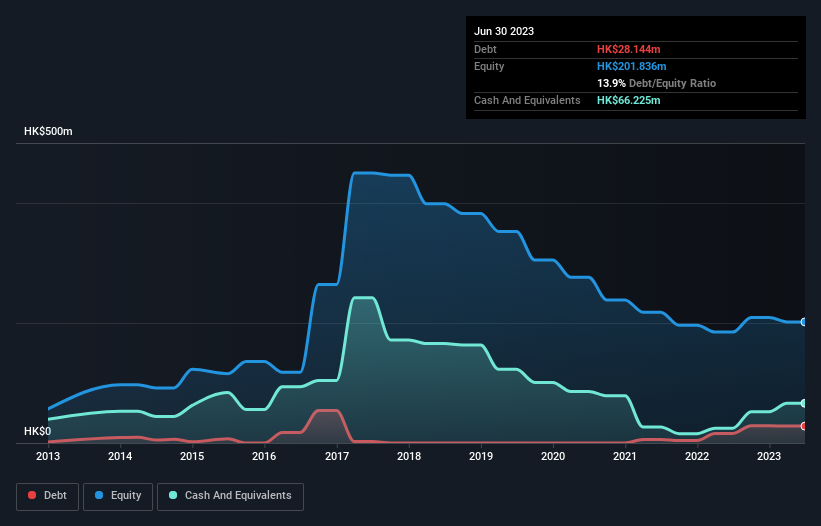Health Check: How Prudently Does Virtual Mind Holding (HKG:1520) Use Debt?
Some say volatility, rather than debt, is the best way to think about risk as an investor, but Warren Buffett famously said that 'Volatility is far from synonymous with risk.' When we think about how risky a company is, we always like to look at its use of debt, since debt overload can lead to ruin. We can see that Virtual Mind Holding Company Limited (HKG:1520) does use debt in its business. But should shareholders be worried about its use of debt?
When Is Debt Dangerous?
Generally speaking, debt only becomes a real problem when a company can't easily pay it off, either by raising capital or with its own cash flow. If things get really bad, the lenders can take control of the business. However, a more common (but still painful) scenario is that it has to raise new equity capital at a low price, thus permanently diluting shareholders. Of course, the upside of debt is that it often represents cheap capital, especially when it replaces dilution in a company with the ability to reinvest at high rates of return. The first thing to do when considering how much debt a business uses is to look at its cash and debt together.
View our latest analysis for Virtual Mind Holding
What Is Virtual Mind Holding's Net Debt?
You can click the graphic below for the historical numbers, but it shows that as of June 2023 Virtual Mind Holding had HK$28.1m of debt, an increase on HK$15.9m, over one year. However, its balance sheet shows it holds HK$66.2m in cash, so it actually has HK$38.1m net cash.

A Look At Virtual Mind Holding's Liabilities
We can see from the most recent balance sheet that Virtual Mind Holding had liabilities of HK$33.3m falling due within a year, and liabilities of HK$24.6m due beyond that. On the other hand, it had cash of HK$66.2m and HK$128.5m worth of receivables due within a year. So it actually has HK$136.9m more liquid assets than total liabilities.
This surplus liquidity suggests that Virtual Mind Holding's balance sheet could take a hit just as well as Homer Simpson's head can take a punch. On this view, lenders should feel as safe as the beloved of a black-belt karate master. Succinctly put, Virtual Mind Holding boasts net cash, so it's fair to say it does not have a heavy debt load! The balance sheet is clearly the area to focus on when you are analysing debt. But you can't view debt in total isolation; since Virtual Mind Holding will need earnings to service that debt. So if you're keen to discover more about its earnings, it might be worth checking out this graph of its long term earnings trend.
Over 12 months, Virtual Mind Holding made a loss at the EBIT level, and saw its revenue drop to HK$98m, which is a fall of 25%. To be frank that doesn't bode well.
So How Risky Is Virtual Mind Holding?
Statistically speaking companies that lose money are riskier than those that make money. And the fact is that over the last twelve months Virtual Mind Holding lost money at the earnings before interest and tax (EBIT) line. Indeed, in that time it burnt through HK$85m of cash and made a loss of HK$46m. But at least it has HK$38.1m on the balance sheet to spend on growth, near-term. Overall, its balance sheet doesn't seem overly risky, at the moment, but we're always cautious until we see the positive free cash flow. There's no doubt that we learn most about debt from the balance sheet. However, not all investment risk resides within the balance sheet - far from it. For example, we've discovered 4 warning signs for Virtual Mind Holding (1 can't be ignored!) that you should be aware of before investing here.
If you're interested in investing in businesses that can grow profits without the burden of debt, then check out this free list of growing businesses that have net cash on the balance sheet.
New: Manage All Your Stock Portfolios in One Place
We've created the ultimate portfolio companion for stock investors, and it's free.
• Connect an unlimited number of Portfolios and see your total in one currency
• Be alerted to new Warning Signs or Risks via email or mobile
• Track the Fair Value of your stocks
Have feedback on this article? Concerned about the content? Get in touch with us directly. Alternatively, email editorial-team (at) simplywallst.com.
This article by Simply Wall St is general in nature. We provide commentary based on historical data and analyst forecasts only using an unbiased methodology and our articles are not intended to be financial advice. It does not constitute a recommendation to buy or sell any stock, and does not take account of your objectives, or your financial situation. We aim to bring you long-term focused analysis driven by fundamental data. Note that our analysis may not factor in the latest price-sensitive company announcements or qualitative material. Simply Wall St has no position in any stocks mentioned.
About SEHK:1520
Virtual Mind Holding
An investment holding company, designs, manufactures, and trades in apparel products in the People’s Republic of China and Hong Kong.
Excellent balance sheet with low risk.
Similar Companies
Market Insights
Community Narratives



